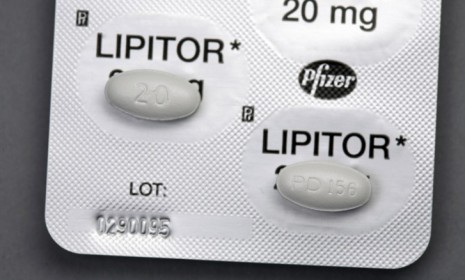The Lipitor warnings: A guide to the FDA's new cholesterol drug labels
A class of cholesterol-reducing drugs called statins will now carry labeling noting potential side effects, which include memory loss and higher blood sugar levels

A free daily email with the biggest news stories of the day – and the best features from TheWeek.com
You are now subscribed
Your newsletter sign-up was successful
The Food and Drug Administration this week officially linked statin drugs — a widely prescribed type of cholesterol-reducing medication — to risks of memory loss and Type 2 diabetes. Reports of potential side effects have been discussed for years, but this marks the first time health officials have highlighted the potential side effects, and called for warning labels on packaging. Here's what you should know about the FDA's new statin warnings:
What are statin drugs?
They're a class of medication used to lower patients' cholesterol and fight heart disease. The drugs work by inhibiting a chemical in the liver required to make cholesterol. Popular brands used in the United States include Lipitor (atorvastatin), Crestor (resuvastatin), Zocor (simvastatin), and Vytorin (simvastatin/ezetimibe).
The Week
Escape your echo chamber. Get the facts behind the news, plus analysis from multiple perspectives.

Sign up for The Week's Free Newsletters
From our morning news briefing to a weekly Good News Newsletter, get the best of The Week delivered directly to your inbox.
From our morning news briefing to a weekly Good News Newsletter, get the best of The Week delivered directly to your inbox.
Do a lot of people use them?
Statins are among "the most widely prescribed drugs in the world," says Gardiner Harris at The New York Times. Last year, close to 21 million Americans were prescribed some variation of the drug. Debate of whether statin is over- or under-used has persisted for years. Some health experts, like Dr. Sidney M. Wolfe, director of Public Citizen's health research group, contend that the drugs' usage should be curbed. Otherwise healthy people with cholesterol levels under 240 "should not be taking these drugs," he said.
What are the risks?
The FDA says statins can increase a person's risk of brain-related side effects, such as memory loss and confusion, says Alice Park at TIME. The new warning labels will also say that the drugs can cause "a small increase" in blood sugar levels and risk of Type 2 diabetes (which can increase risk of heart disease). The FDA will do away with the requirement that doctors monitor a patient's liver enzymes for organ damage; the agency concluded that "such serious damage is rare, and regular testing for all users isn't necessary." The FDA made its decision based on a review of medical literature, recent reports of symptoms, and data from clinical trials.
A free daily email with the biggest news stories of the day – and the best features from TheWeek.com
Does that mean the drugs are dangerous?
The side effects are "rare and mild," says Lara Salahi at ABC News. But in this instance, the FDA is trying to be "as transparent as possible" with alerts and labeling, Dr. Amy G. Egan of the FDA tells The New York Times. "The value of statins in preventing heart disease has been clearly established," she says. "Their benefit is indisputable, but they need to be taken with care and knowledge of their side effects."
Sources: ABC News, Forbes, Medical News Today, New York Times, TIME
-
 Buddhist monks’ US walk for peace
Buddhist monks’ US walk for peaceUnder the Radar Crowds have turned out on the roads from California to Washington and ‘millions are finding hope in their journey’
-
 American universities are losing ground to their foreign counterparts
American universities are losing ground to their foreign counterpartsThe Explainer While Harvard is still near the top, other colleges have slipped
-
 How to navigate dating apps to find ‘the one’
How to navigate dating apps to find ‘the one’The Week Recommends Put an end to endless swiping and make real romantic connections